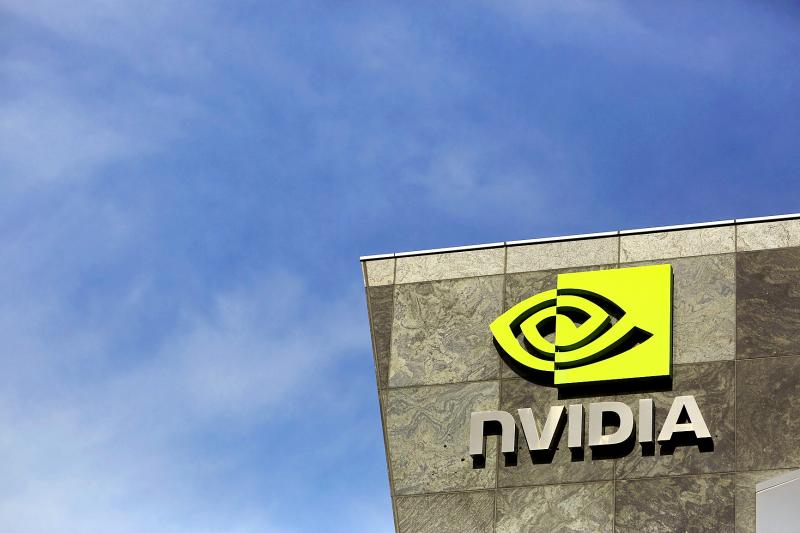Nvidia Corp is quietly preparing to abandon its purchase of Arm Ltd from Softbank Group Corp after making little to no progress in winning approval for the US$40 billion chip deal, people familiar with the matter said.
Nvidia has told partners that it does not expect the transaction to close, said one person, who asked not to be identified because the discussions are private.
Meanwhile, Softbank is stepping up preparations for an Arm initial public offering as an alternative to the Nvidia takeover, another person said.

Photo: Reuters
The purchase — poised to become the biggest semiconductor deal in history when it was announced in September 2020 — has drawn a fierce backlash from regulators and the chip industry, including Arm’s own customers.
The US Federal Trade Commission sued to stop the transaction in December last year, saying that Nvidia would become too powerful if it gained control of Arm’s chip designs.
The acquisition also faces resistance in China, where authorities are inclined to block the takeover if it wins approvals elsewhere, one person said.
However, hey do not expect it to get that far.
Nvidia and Arm’s leadership are still pleading their case to regulators, and no final decisions have been made, the people said.
Through it all, the companies have publicly maintained their commitment to the purchase.
“We continue to hold the views expressed in detail in our latest regulatory filings — that this transaction provides an opportunity to accelerate Arm and boost competition and innovation,” Nvidia spokesman Bob Sherbin said.
“We remain hopeful that the transaction will be approved,” a Softbank spokesperson said in an e-mailed statement.
The sale of Arm is under heavy scrutiny, because its chip designs are used in everything from phones to vehicles to factory equipment, making neutrality the foundation of its business model.
The world’s biggest tech companies rely on Arm technology, and they fear they could lose unfettered access under Nvidia.
Tech giants have lined up against the takeover. A group that includes Qualcomm Inc, Microsoft Corp, Intel Corp and Amazon.com Inc have provided regulators around the world with what they believe is enough ammunition to kill the deal, people familiar with the process said.
In addition to needing approval in the US and China, the Arm purchase needs clearance from the EU and the UK, both of which are studying the deal closely.
The initial agreement between Nvidia and Softbank expires on Sept. 13 — two years after it was forged — but it would automatically renew if approvals take longer.
Softbank and Arm are entitled to keep US$2 billion Nvidia paid at signing, including a US$1.25 billion breakup fee, whether the deal goes through or not.

MULTIFACETED: A task force has analyzed possible scenarios and created responses to assist domestic industries in dealing with US tariffs, the economics minister said The Executive Yuan is tomorrow to announce countermeasures to US President Donald Trump’s planned reciprocal tariffs, although the details of the plan would not be made public until Monday next week, Minister of Economic Affairs J.W. Kuo (郭智輝) said yesterday. The Cabinet established an economic and trade task force in November last year to deal with US trade and tariff related issues, Kuo told reporters outside the legislature in Taipei. The task force has been analyzing and evaluating all kinds of scenarios to identify suitable responses and determine how best to assist domestic industries in managing the effects of Trump’s tariffs, he

TIGHT-LIPPED: UMC said it had no merger plans at the moment, after Nikkei Asia reported that the firm and GlobalFoundries were considering restarting merger talks United Microelectronics Corp (UMC, 聯電), the world’s No. 4 contract chipmaker, yesterday launched a new US$5 billion 12-inch chip factory in Singapore as part of its latest effort to diversify its manufacturing footprint amid growing geopolitical risks. The new factory, adjacent to UMC’s existing Singapore fab in the Pasir Res Wafer Fab Park, is scheduled to enter volume production next year, utilizing mature 22-nanometer and 28-nanometer process technologies, UMC said in a statement. The company plans to invest US$5 billion during the first phase of the new fab, which would have an installed capacity of 30,000 12-inch wafers per month, it said. The

Taiwan’s official purchasing managers’ index (PMI) last month rose 0.2 percentage points to 54.2, in a second consecutive month of expansion, thanks to front-loading demand intended to avoid potential US tariff hikes, the Chung-Hua Institution for Economic Research (CIER, 中華經濟研究院) said yesterday. While short-term demand appeared robust, uncertainties rose due to US President Donald Trump’s unpredictable trade policy, CIER president Lien Hsien-ming (連賢明) told a news conference in Taipei. Taiwan’s economy this year would be characterized by high-level fluctuations and the volatility would be wilder than most expect, Lien said Demand for electronics, particularly semiconductors, continues to benefit from US technology giants’ effort

‘SWASTICAR’: Tesla CEO Elon Musk’s close association with Donald Trump has prompted opponents to brand him a ‘Nazi’ and resulted in a dramatic drop in sales Demonstrators descended on Tesla Inc dealerships across the US, and in Europe and Canada on Saturday to protest company chief Elon Musk, who has amassed extraordinary power as a top adviser to US President Donald Trump. Waving signs with messages such as “Musk is stealing our money” and “Reclaim our country,” the protests largely took place peacefully following fiery episodes of vandalism on Tesla vehicles, dealerships and other facilities in recent weeks that US officials have denounced as terrorism. Hundreds rallied on Saturday outside the Tesla dealership in Manhattan. Some blasted Musk, the world’s richest man, while others demanded the shuttering of his